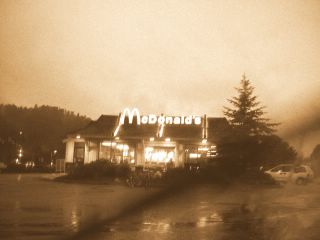
After my semester ends, I typically feel justified in reading a handful of books that would never see the light of day during the academic year. I justify it in the same way that a healthy eater justifies swinging by McDonald’s after not touching junk food for six months.
Usually, my biannual trips to McDonald’s end with a conversation where “cardboard” is mentioned several times. I guess if I’d been really astute, I would have benefited from the MD’s parallel and eased up on my justified junk book consumption.
Love dictates that we should make an effort to “believe the best” about people, but this dictum doesn’t hold true for books—especially after the first 50 pages. Nevertheless, in the last couple weeks I’ve made my way through two disposable novels, stubbornly hoping that the best was still to come. It wasn’t.
I guess there is some benefit in documenting time lost to junk books (in search of wasted time, ala Marcel Proust), in that it could remind me not to do this again. And at the very least, it points up the contrast between throwaway lit and the really good stuff. Just be warned: these books will definitely not appear on the Master Book List. In House (Ted Dekker & Frank Peretti), the authors begin writing a gritty suspense-thriller, then attempt to change ship midstream and craft a spiritual allegory. The parallels are strained, to say the least, the supernatural drama is overdone. I came away wondering who the intended audience was. If Dekker and Peretti were writing to Christians, then an occasional adrenalin thrill (it is a fast read) is the only real draw. If they’re hoping to influence a secular audience, then the gospel is unnecessarily macabre and watered down.
In House (Ted Dekker & Frank Peretti), the authors begin writing a gritty suspense-thriller, then attempt to change ship midstream and craft a spiritual allegory. The parallels are strained, to say the least, the supernatural drama is overdone. I came away wondering who the intended audience was. If Dekker and Peretti were writing to Christians, then an occasional adrenalin thrill (it is a fast read) is the only real draw. If they’re hoping to influence a secular audience, then the gospel is unnecessarily macabre and watered down.
 In Lavondyss (Robert Holdstock), weirdly paced action, pervasive occultism, and an unintelligible plot marred the sequel to Holdstock’s somewhat gripping Mythago Wood achievement. The new “heartland” is bloodier, harsher, and ultimately overreaches itself. I won’t be back.
In Lavondyss (Robert Holdstock), weirdly paced action, pervasive occultism, and an unintelligible plot marred the sequel to Holdstock’s somewhat gripping Mythago Wood achievement. The new “heartland” is bloodier, harsher, and ultimately overreaches itself. I won’t be back.One upshot of my having read these books is that now my tentative Summer Reading Ideas have hardened into a gritty Plan of Action. I want to get this cardboardish taste out of my mouth. (Note: I'm not saying that "pulp fiction" is worthless and bad, per say, but that even a fast, lightweight read shoud be done well.)

Thanks to a query from Verashni, C.S. Lewis’s The Pilgrim’s Regress is near the top of the pile. This is one of the last books in the Lewis canon that I haven't read in its entirety.

Mark Driscoll’s Confessions of a Reformission Rev.is also on tap. I'm planning to read Driscoll's book before I go hear him speak at this year's Desiring God conference.
 A couple days ago, while listening to Garry Wills’ excellent biography of Saint Augustine, I heard a phrase dear to the influential philosopher and theologian: “Sailing toward an ever-receding shore.” This phrase, which Augustine drew from his favorite poem, Virgil’s Aeneid, was one of the metaphors which he used to characterize his exploration of an infinitely perfect Christ. The line was so beautiful that I resolved to read The Aeneid on the spot.
A couple days ago, while listening to Garry Wills’ excellent biography of Saint Augustine, I heard a phrase dear to the influential philosopher and theologian: “Sailing toward an ever-receding shore.” This phrase, which Augustine drew from his favorite poem, Virgil’s Aeneid, was one of the metaphors which he used to characterize his exploration of an infinitely perfect Christ. The line was so beautiful that I resolved to read The Aeneid on the spot.
As well, I’ll continue to make my way through Eugene Peterson’s introduction to “spiritual theology,” Christ Plays in Ten Thousand Places.
So there’s a look at my partial summer reading list. Apparently some good can come from junk books after all, in a kind of accidental, roundabout way.










3 comments:
The Aeneid is, as my lit. teacher would probably say, "delightful." It has good phrasing -- 'specially if you happen to read the edition you posted a picture of.
The Aeneid is THE pinnicle of Latin literature. Period.
Who would have thought that The Aeneid would provoke the most interest on the list? Nice work, Virgil! Thanks for the Latin props, LittlePeace and Andrew. Now I have added incentive to jump into David West's translation...
Kandykane, Wuthering Heights is striking for its intense emotions. I am definitely with you there. I never really felt like Heathcliffe got his comeuppance, though. Thanks for the comment - your interest in "the good stuff" makes you a five star contributor.
Post a Comment